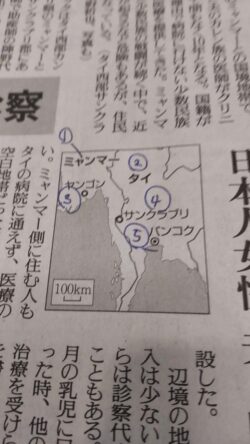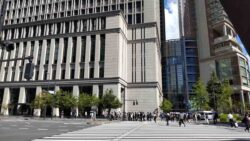Imperial guards on heightened alert as Imperial family visits to regional areas set to resume

In a drill premised on a gun having been fired, guards and others instantly surround a stand-in for the Emperor, far left, at the Imperial Guard Headquarters on the grounds of the Imperial Palace on May 16.
12:04 JST, September 29, 2022
Police in charge of guarding the Imperial family have been on increased alert as the family members are to bring their visits to regional areas of Japan back into full swing this autumn.
This is due to growing concerns about the potential for a copycat attack after the fatal shooting of former Prime Minister Shinzo Abe in July. As the police cannot block Imperial family members’ interactions with ordinary citizens, they are increasing their vigilance and conducting practical drills.
Wary of copycats
The October and November calendar includes three of the four major annual regional events attended by the Emperor and Empress: the National Sports Festival (in Tochigi Prefecture this year), the National Cultural Festival (Okinawa Prefecture), and the Festival of Celebration for Maritime Resources (Hyogo Prefecture).
Amid the COVID-19 pandemic, the Imperial couple attended these annual events held in regional areas online. As infection numbers have dropped, however, the Emperor and Empress are expected to attend the opening ceremony of the National Sports Festival on Oct. 1, marking their first such appearance in almost two years and nine months.
The family of Crown Prince Akishino already resumed their regional visits this spring, and they have a variety of events lined up for fall as well.
The police have been heightening their vigilance in situations where potential attackers could lurk in the crowds gathered in front of train stations and along roadsides, as happened in the shooting of Abe.
“There are those in society who harbor one-sided grudges toward others with no grounds whatsoever. We should not think that members of the Imperial family would not be targeted just because they belong to the Imperial family,” said a senior official of the Imperial Guard Headquarters (IGH).
There have been incidents targeting the Imperial family in the past. In 1923, a car carrying the then regent, later Emperor Showa, was shot at by an anarchist, resulting in injury to an aide who was in the car. In 1975, when then Crown Prince Akihito and Princess Michiko — now the Emperor Emeritus and Empress Emerita — visited the Himeyuri Monument in Okinawa Prefecture, extremists threw a Molotov cocktail at them.
In recent years, such extremist campaigns against the Imperial family appear to be subsiding, but there have been crimes committed by individuals who do not belong to any extreme organizations, such as the person who left a knife on the desk of Crown Prince Akishino’s son Prince Hisahito, 16, at his junior high school in April 2019.
‘Soft guard’
At a press conference in July, Yasu- hiko Nishimura, grand steward of the Imperial Household Agency, who has served as director general of the Security Bureau of the National Police Agency (NPA), and as superintendent general of the Metropolitan Police Department, urged the police to act on lessons learned from the Abe shooting.
But he also said, “I hope they will see to it that no wall is created between the public and the Imperial family.”
Security arrangements for the Imperial family changed drastically in the early years of the Heisei era at the behest of the then reigning Emperor and Empress.
In the Showa era, a “visible security” arrangement was adopted in which uniformed police were stationed along the roadside where an Imperial family motorcade would pass by and traffic in the opposite lane was stopped.
However, in the following Heisei era, “visible security” was replaced with a “soft guard” approach consisting mainly of plainclothes police officers mobilized along the roadside, with traffic in the opposite lane impeded as little as possible.
Imperial family members approach and even speak to people gathered in front of train stations and elsewhere.
At other times their cars would slow down, with the family members rolling down the windows and waving to the people. The Imperial family in the Reiwa era continued this style. The senior IGH official said, “We must respect Their Majesties’ feelings.”
Protective human wall
In August, the NPA, in light of the lessons learned from the Abe shooting, revised its security regulations that stipulate how dignitaries such as politicians should be protected, but it did not change the guarding regulations that govern the protection of the Imperial family.
Security for the Emperor and Empress tends to be carefully planned months in advance by the NPA, the IGH and the relevant prefectural police headquarters. The senior IGH official said that this approach “differs from that for politicians on canvassing tours, whose plans are made at a moment’s notice.”
However, it is difficult to inspect people’s belongings along the roads, and the possibility of armed malefactors cannot be ruled out.
Members of the IGH have been holding drills simulating a firearms attack, and they have flexibly reviewed the positioning of their personnel so that they can quickly form a human wall for Imperial family members in case of an emergency.
“Each guard should expect their ability to be put to the test,” the senior IGH official said.
Nishimura of the Imperial Household Agency said, “How to ensure the security of the Imperial family in a way that does not impede their affinity with the people is a never-ending challenge for the police involved in their security.”
"Society" POPULAR ARTICLE
JN ACCESS RANKING







